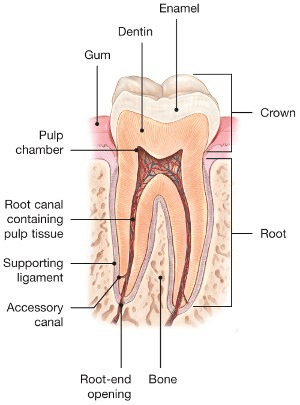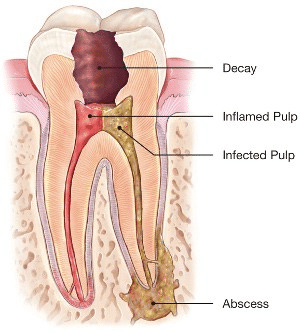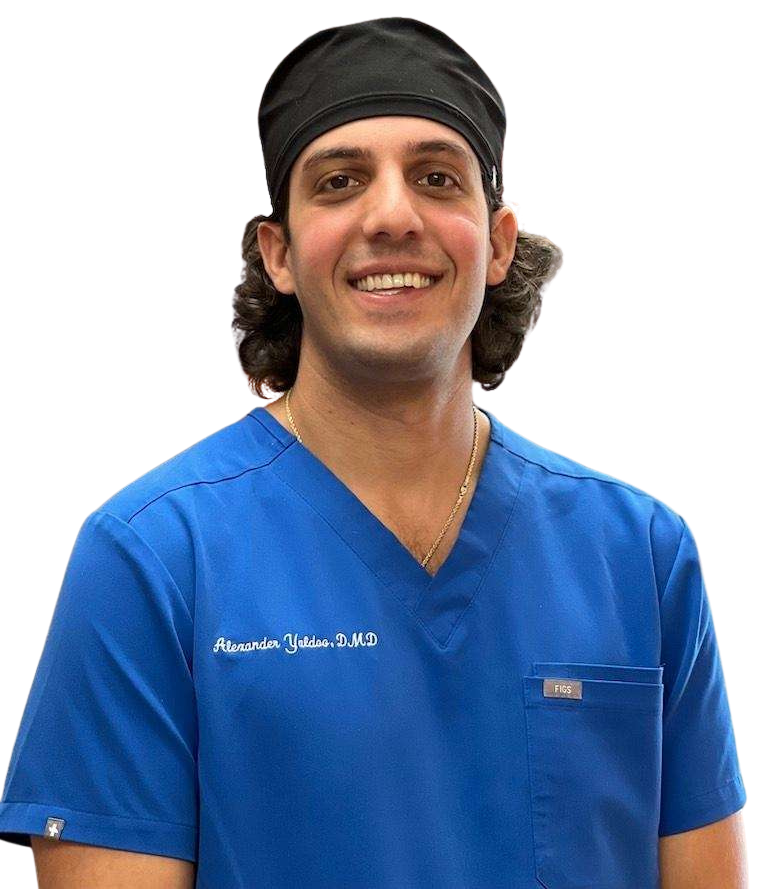
Root Canal Therapy in Dunedin

A HEALTHY, BEAUTIFUL SMILE STARTS HERE
Don’t be terrified by the stories you’ve probably heard about root canals. Root canals are your friend! A root canal is a specialized dental procedure designed to restore severely damaged, decaying or infected teeth. This process involves removing the nerve and blood vessels from the interior portion of the tooth, thoroughly cleaning and disinfecting the area, and then sealing it to prevent further infection. When a root canal is done properly, you get to save your natural teeth as long as reasonably possible, which is part of our goal at TLC Dentistry.
The 3 layers of a tooth:
- Enamel - The outermost layer of the tooth
- Dentin - The middle layer of the tooth
- Pulp - The innermost portion of the tooth that contains the nerve and blood vessels
The Importance of Early Detection: When Do You Need a Root Canal?
It’s crucial to get problems, like cavities, addressed while they are still in the enamel layer. Once cavities get into the dentin layer, a patient may begin to experience more sensitivity, as this layer has tiny little microscopic tubes that connect to the pulp where the nerve is located. It's highly important to keep the whole tooth healthy and free of bacteria to prevent discomfort and infection, and therefore to ensure you can comfortably use the tooth for its necessary function. Just because you have a cavity in the enamel or dentin, it does not necessarily mean that a root canal is needed. The sooner we address the issue, the less likely you will need a root canal.
Factors that compromise the health of the pulp of the tooth:
Deep Cavities
Crack or Fractures
Extensive dental procedures on a tooth
Trauma/Injury
Severe gum infections that can travel to the nerve
The Root Canal Procedure Explained
At TLC Dentistry, we like to give our patients a walk through the step-by-step process of root canal treatment, along with essential tips for a smooth recovery and improved oral well-being.
The procedure itself can sometimes be lengthy and occasionally requires multiple appointments to ensure the most effective treatment. During the procedure, the first thing we would most certainly do is make sure the patient is properly numb. After this, the decay and the pulp contents are removed from the tooth. After a final cleansing, a fake nerve that is covered in a sealing medication is placed in the canal to fill the space where the nerve once was. After the root canal is complete, it’s often necessary to add back to the missing portion of the tooth with what we call a “build up” or “core”. Additionally, it’s typically advised to get a crown placed on the root canal-treated tooth. With the absence of the blood vessels and nerves in the tooth, the tooth fails to get nutrients from the body, hence leading to the tooth not being as strong as it was before and therefore our recommendation to cover the tooth with a crown.
The Root Canal “Core” Build Up
In most root canal cases, the root canal procedure is accompanied by what's known as a "build-up," followed by the placement of a crown or bridge. The build-up is a critical step in the process. It entails the removal of any signs of infection from the tooth and the addition of a restorative material to replace what has been lost. Sometimes a post is added in the center of the build-up for increased retention if a significant amount of tooth structure is lost. This not only strengthens the tooth but also provides the necessary retention and support for the final crown or bridge. Without the build-up and the crown or bridge, you'll have a very brittle tooth that can break easily. The absence of nerve and blood supply implies no nutrients reach the tooth, hence leading to the tooth not being as strong as it was before.
The build-up procedure ensures that the tooth is robust enough to withstand the daily pressures of chewing and biting. It serves as a foundation for the final restoration, be it a crown or bridge. This final step in the process not only reinforces the structural integrity of the tooth but seals in the root canal and protects it from further damage.


Slide title
Write your caption hereButton
Slide title
Write your caption hereButton
Dunedin's Distinguished Dentist
Meet our experienced dentists, Dr. Natalia Radzikowski and Dr. Alexander Yaldoo. They are redefining what a visit to the dentist can feel like. Picture a place where you feel like part of a large, extended family and not just a patient. Your comfort and confidence are their priorities.
Root canal therapy doesn't have to be scary. We offer comfortable, modern techniques.
Hear it from our patients


Will definitely be a patient for LIFE!!
Rameen Elias

Grace Regan

Hackett Family

Chantell A

Sandra Kane

Karen Phillips
The TLC Dentistry experience is about more than just dental care—it's about feeling seen, heard, and valued. Imagine settling into your comfortable dental chair, knowing you're in safe, caring hands.

